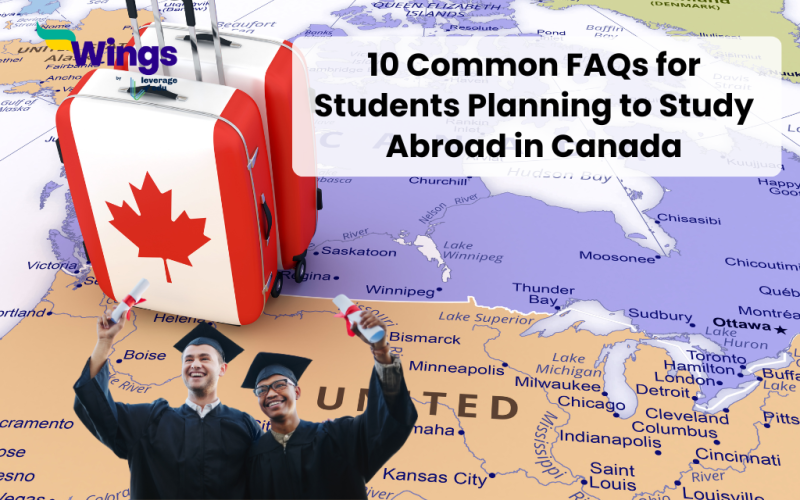Planning to study in Canada? Well, moving abroad and planning to study abroad is a very difficult decision for students. Canada is one of the first countries that a student might think of while studying abroad. Now you might be wondering about different questions that can pop into your mind.
These questions can be related to your accommodations, universities abroad, programmes offered, study visa, work visa and much more. Keep scrolling through to learn “10 Common FAQs for Students Planning to Study Abroad in Canada”
This Blog Includes:
- 1. What are the reasons to study in Canada?
- 2. What are the requirements to study in Canada?
- 3. How much does it cost to study in Canada?
- 4. Are there scholarships available for international students?
- 5. Is it possible to work while studying in Canada?
- 6. What is the process for applying to Canadian universities?
- 7. What is a study permit?
- 8. What are the best cities in Canada for international students?
- 9. How do I find accommodation in Canada?
- 10. Is it possible to stay in Canada after graduation?
1. What are the reasons to study in Canada?
Canada is very well known for its high-quality education, with many universities ranked among of the best in the world. Canada offers a multicultural environment, safe cities, and beautiful natural landscapes. Other than this, Canadian degrees are recognized globally, and there are opportunities for work and immigration after graduation.
2. What are the requirements to study in Canada?
To study in Canada, you need a study permit if your course lasts six months. Requirements generally include:
- LOR from an accepted university
- Proof of sufficient funds for tuition fees, living expenses, and return transportation.
- A valid passport.
- A clean criminal record (police certificate may be required).
- Medical exam results
3. How much does it cost to study in Canada?
Tuition fees vary by program and institution but generally range from CAD 15,000 to CAD 35,000 per year for undergraduate programs. Living expenses, including accommodation, food, transportation, and personal expenses, can range from CAD 10,000 to CAD 15,000 per year. It’s important to budget accordingly.
4. Are there scholarships available for international students?
Yes, there are various scholarships, grants, and bursaries available for international students. These grants and scholarships can be offered by the Canadian government, individual universities, or private organizations. Make sure to do your research prior and then apply.
Also Read: Study in Canada: Colleges, Fees, Eligibility, Scholarships
5. Is it possible to work while studying in Canada?
Yes, international students can work part-time (up to 20 hours per week) during the academic term and full-time (up to 40 hours per week) during scheduled breaks, like summer vacation. These part-time jobs can help you financially and mentally.
6. What is the process for applying to Canadian universities?
The application process generally involves:
- The first step is to research and select the universities and programs.
- Checking specific admission requirements for each program.
- Preparing necessary documents.
- Taking required tests.
- Submitting applications online before the deadlines.
- Paying the application fee.
7. What is a study permit?
A study permit is an official document issued by the Canadian government. This document allows different international students to study at different designated learning institutions in Canada.
8. What are the best cities in Canada for international students?
Popular cities for international students include:
- Toronto: The environment here is Diverse and vibrant. It has universities like the University of Toronto and Ryerson University.
- Vancouver: This city is known for its scenic beauty and institutions like the University of British Columbia and Simon Fraser University.
- Montreal: is famous for being a cultural hub. The best universities here are McGill University and Université de Montréal.
- Ottawa: It is the capital city, The best universities here are the University of Ottawa and Carleton University.
9. How do I find accommodation in Canada?
There are two methods to find accommodation in Canada i.e. on campus, and off campus and there are many homestays available too.
- On-campus housing: Dormitories or residence halls provided by universities.
- Off-campus housing: Renting apartments or shared houses.
- It’s advisable to start searching early and consider factors like proximity to campus, cost, and amenities.
10. Is it possible to stay in Canada after graduation?
Yes, international students can apply for a Post-Graduation Work Permit (PGWP), which allows you to work in Canada for up to three years after graduation. This experience can be beneficial if you wish to apply for permanent residency. It can be applied through different programs under the Express Entry system.
Also Read: Requirements to Study in Canada 2024 | Leverage Edu
RELATED BLOGS
To explore more universities to study abroad, make sure to subscribe to Leverage Edu today. You can also contact us at 1800572000 for a free 30-minute counselling session to turn dreams of studying abroad into reality. Thank you for reading!
 One app for all your study abroad needs
One app for all your study abroad needs















 60,000+ students trusted us with their dreams. Take the first step today!
60,000+ students trusted us with their dreams. Take the first step today!